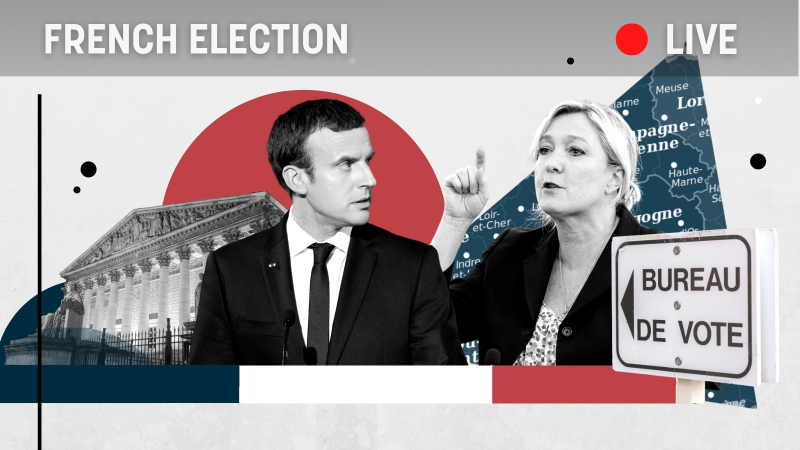By Stéphane Delcros and Nicolas Croes, Left Socialist Party (our sister organisation in Belgium)
The second round of the French presidential elections ended with 58.5% for Macron and 41.5% for Le Pen. The enthusiasm for Macron was very limited. The number of people who abstained reached the second highest level for a second round in the history of the Fifth Republic: 28%, to which should be added 4.6% blank and 1.6% invalid votes. Taking that into account, Macron won with only 37.9% of registered voters. This makes him the worst scoring president of the Fifth Republic since 1969. Then, one year after May 1968, Pompidou did even worse. Almost two out of three French people did not vote for Macron. Of those who did, 42% said they voted for Macron to stop Le Pen. Macron’s real ‘following’ is thus limited to 15.9% of the population.
Macron’s first term in office was marked by anti-social attacks, police brutality and increased insecurity for large parts of the population. At the same time, scapegoats were sought with an optimal exploitation of the divide-and-conquer strategy. The ideas of the extreme right were trivialised to the point of acceptability. This paved the way for a new growth of right-wing extremist ideas. Macron offered no answer to the extreme right, on the contrary!
It looks like he will continue on the same path. Macron claims to have understood that his second term of office should put more emphasis on the social and the ecological. He will no doubt try to maintain a semblance of a progressive image, possibly by appointing a prime minister with some social, feminist and ecological credentials. Macron may increase some of the lowest wages and pensions. But essentially, he is preparing to simply continue policies that benefit the rich.
When he was elected in 2017, Macron continued to attack labour legislation. Under President Francois Hollande (‘Socialist’ Party), the offensive had already begun with the El Khomri law. Macron wanted to further individualise labour relations, away from collective bargaining in order to weaken the role of trade unions. In his programme for 2022, Macron stated that he wanted “to continue the modernisation of labour legislation that started in 2017.” He also made no secret during his campaign of his plan to raise the retirement age to 65.
Between the two rounds of the presidential election, we could read on Mediapart’s website a testimony by N’Diaye, a 23-year-old black rubbish collector who is a practising Muslim. He said he cannot imagine having to work until the age of 65. At 1,600 euros a month, he says he is much more afraid of the price rises than Le Pen’s racism. He thought Le Pen would do more for the cost of living crisis.
This testimony sums up a lot: the deep rejection of Macron’s antisocial and authoritarian policy, but also the danger posed by the far right Rassemblement National which has succeeded in instrumentalising the concerns of parts of the population by pretending to defend living standards. It is a false ‘social’ programme. In this way the open racism and hatred in the campaign was largely left to the other far right candidate, Zemmour and the candidate from the traditional right wing ’Les Republicains’, Pécresse. It should be clear that Macron does not offer an answer to the extreme right, but just a guarantee for its further strengthening.
Mélenchon: organizing around his programme
In the first round, the score of the candidate of the “Union Populaire” (People’s Union) and of La France Insoumise, Jean-Luc Mélenchon, far exceeded expectations. This campaign was based on a programme that proposed a left-wing break with the status quo. Mélenchon won votes from those who were disillusioned with the other so-called left-wing parties that were fully engaged in the system and participated in governments with a right-wing programme. These were mainly the social democratic PS, but also the green party EELV and the communist PCF. In addition, Mélenchon also attracted votes from sections of the population that had originally no intention of going to the polls, especially young people and residents of the poor suburbs around the big cities.
With 22% for Mélenchon in the first round, the difference with Le Pen was very small. The left-wing parties (PCF, NPA, LO) that preferred to go out on their own with a campaign ‘to exist’ rather than to strengthen the momentum of Mélenchon’s campaign bear a heavy responsibility for the fact that the choice in the second round was one between Macron and Le Pen.
Many analysts emphasise that the “useful vote” of the left gave Mélenchon’s score a big boost at the end of the campaign. However, at the beginning of March, more than a month before the first round, Mélenchon was at a maximum of 12% in the polls while the other left-wing or so-called ‘left-wing’ candidates were roughly in line with or only slightly above their final first round results. In reality, Mélenchon’s score has much more to do with the rejection of the policies of most of the others and the will to defend a social and ecological programme that breaks with the policies pursued in favour of a minority of ultra-rich people.
Besides the traditional left-wing voters, people who had no intention of voting were attracted. In the latest polls, the expected turnout was still 5 percentage points below the final participation in the elections. Mélenchon voters who suffered most from Macron’s politics — in the overseas departments and regions, among manual workers, among the poorest — voted disproportionately for Le Pen in the second round to block Macron. In the big cities and among young people, Mélenchon voters largely shifted to Macron in order to block Le Pen. About 40% of the Mélenchon voters in the first round didn’t bother to vote in the second round, showing their opposition to both candidates.
This result contradicts all those who hoped that Mélenchon’s breakthrough in 2017 was one-off. It also provides a powerful response to those who began the election campaign in the grip of despair and pessimism. Three major blocs emerged in the first round: a sharply decaying neoliberal and authoritarian right-wing bloc, a growing far-right bloc of Le Pen that managed to win strata abandoned by the system (especially in more rural areas and in former strongholds of the PCF) and a third growing bloc of the radical left.
As soon as the results of the first round were known, Mélenchon called for “not giving a single vote to Le Pen.” He stressed the need to remain mobilised in the run-up to the parliamentary elections of 12 and 19 June. “Given the positions of the two protagonists, there is no possibility in the second round of the indispensable rupture necessary to respond to the triple ecological, social and democratic crisis. None of the political tensions in the country will be resolved. On the contrary, they are likely to get worse.” After Macron’s victory, Mélenchon said, “The voters can still defeat Macron and choose a different path. On 12 and 19 June, another world is still possible if you elect a majority of deputies from the Popular Unity, a new unity that we must continue to expand.”
La France Insoumise wants to unite the left to win the electoral “third round”. This would oblige Macron to work with a left-wing majority in parliament. This “Union Populaire” (Popular Union) wants to bring together political organisations, prominent figures on the left, trade unions, associations, cultural organisations … around a programme based on the broad lines defended in “L’Avenir en Commun”, Mélenchon’s programme.
Among the “non-negotiable” programme items are: retirement at 60; repeal of the El Khomri law and the counter-reforms of the labour code and unemployment insurance; the increase of the minimum wage to 1400 euros net per month; an allowance for young people of 1063 euros per month; freezing the prices of basic products; ecological planning; the ending of the presidential monarchy with a Sixth Republic and referendums called by popular initiative; the development of public services; an end to privatisation and liberalisation; investment of 1 billion euros in the fight against violence against women; fair taxation with the reintroduction of the wealth tax and the abolition of the flat tax; the abolition of the laws on separatism, on global security and on health passes; and non-compliance with European rules that are incompatible with these proposals. “This is the minimum basis on which discussion is possible,” Mélenchon said.
Direct talks have started with the green party EELV (4.6% in the first round), the French Communist Party, PCF (2.3%) and the New Anti-Capitalist Party, NPA (0.8%). Negotiations with the PCF seem to be going well, although the communist party seems to be demanding candidates in more constituencies. Among the Greens, tensions are high, as was already evident in the September Green primaries, which were won by the representative of the liberal wing, Yannick Jadot, who won with only 51% over Sandrine Rousseau, who defended a more social and ecological programme.
The PS was not invited to the negotiations, but its electoral disaster (1.7%) left it no choice but to at least open up and the first talks have begun. However, party secretary Olivier Faure stated bluntly: “The pension reform that La France Insoumise wants will cost 72 billion. I think this money could also be used for education or the ecological transition. I don’t think we should reduce everyone’s career back to 40 years.” At least the PS’s reluctance to pursue social policies is clear.
His predecessor as party secretary, Jean-Christophe Cambadélis, was even less open to negotiation and called for the PS to self-dissolve and relaunch at a congress in the autumn. Former President François Hollande warned unequivocally that the PS risks “disappearing” in the event of an electoral agreement with La France Insoumise. He defends the option of unity with the Greens and the PCF. This amounts to a return to the “pluralist left” that pursued an anti-social policy under the Jospin government and was humiliatingly punished for it in 2002. By repeatedly leading governments that do not defend the interests of working people, the PS (like the Greens) is more part of the problem than part of the solution.
For a third round of struggle
There are some strong points in the programme proposed by La France Insoumise, including the ambitious social proposals and the ecological planning to move away from carbon and nuclear energy. But it remains a reformist programme, without any demand for nationalisation under democratic control and management of the key sectors of the economy. The programme limits itself to proposing public poles that must compete with the market and are therefore subject to its dictates. The proposal for a Sixth Republic sums up the illusory search for a social alternative within the narrow confines of the capitalist system.
This is the Achilles heel of Mélenchon’s proposals. In a period of multiple crises of capitalism that reinforce each other, the challenges are greater. The workers’ movement must mobilise all forces existing in society to meet these challenges. It would be better if this were clarified openly, so that a start can be made on building the balance of forces that we need now, in the parliamentary elections, but also and especially in the workplaces, in the schools and universities and in our neighbourhoods. It is on the streets above all that we can achieve victories, using parliamentary platforms and the profile this provides as a supporting force.
“Le Pen was not elected to power, now let’s make sure Macron doesn’t stay there.” With this slogan, La France Insoumise began its campaign to impose a leftist parliamentary majority on President Macron by electing Mélenchon as Prime Minister. This campaign has the merit of providing a perspective for a next step in the struggle following the presidential elections and in the runup to the parliamentary elections. It also focuses on clear programmatic points that a government could implement instead of limiting itself to pure “opposition politics”.
But without a real balance of forces in society in favour of the working class which can only be built by mobilisation and mass organization, it will be difficult not only to mobilise enough potential abstainers to win these elections, but also to implement such a programme if elected. With the help of the trade unions, left-wing organisations and associations, we must build a consistent balance of forces in the streets and in the workplaces to impose even these limited demands and to face the reaction of the ruling class, which will do everything in its power to prevent genuine left-wing policies from being implemented.
This would be even more so the case for a Left-controlled parliament in the context of French capitalism’s undemocratic Presidential system which has powers to override parliament.
This is how the ‘third round of struggle’ can be built: through struggles in the streets, in the workplaces and in the neighbourhoods against Macron’s policies, which strengthen the extreme right by increasing inequality and precariousness; which brutalise protest movements, populations of Africans, Muslims, immigrants, the peoples of the ‘overseas territories’ and young people; and which exacerbate climate disruption.
A large-scale struggle is the best way to enforce a strong presence of left-wing deputies in the National Assembly and fight for the social and environmental policies that the Popular Unity can pursue. Or at least to fight back against any attack that a government at the behest of Macron will attempt to carry out and to create a balance of forces favourable to the working class that workers and young people can base themselves on in their struggles in the coming months.
With its hegemonic position on the left, La France Insoumise faces great challenges. A great danger is posed by those who now openly ogle at Mélenchon out of opportunism, such as former PS presidential candidate Ségolène Royal.
When Syriza ousted Pasok in Greece, a lot of career social-democrats moved over to that left-wing formation as well. This strengthened the process of turning Syriza into a party that was subservient to the markets. The best way to repel these opportunists is to increase La France Insoumise’s involvement in struggles and significantly strengthen democratic organisation around its grassroots groups. This could lay the foundations for the creation of a real political instrument of the workers and the oppressed, a broad-based party of struggle, with democratic participation at its base, determining its orientation in order to achieve what is objectively required for the whole working class: the building of a totally different society, a democratic socialist society.












